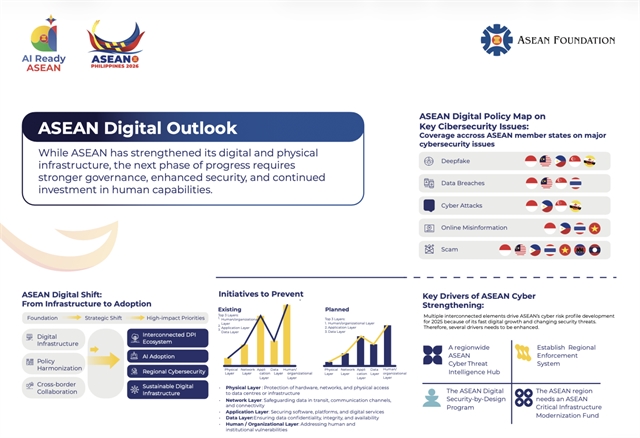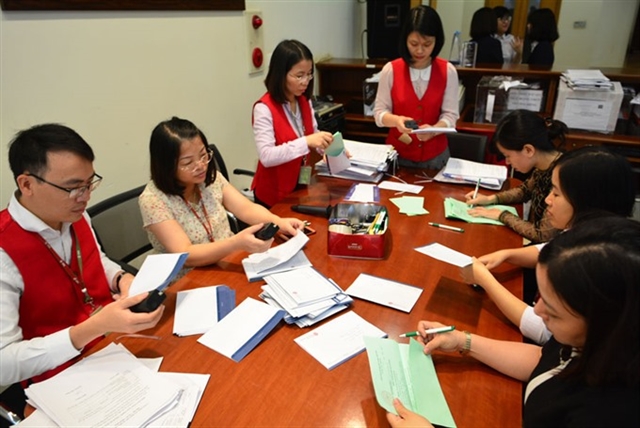 Economy
Economy

To urgently support the stock market, the finance ministry cut fees of nine securities services and exempted fees for six others from March 19.

|
| A stock auction at Hà Nội Stock Exchange. The Ministry of Finance has issued a new circular guiding the reduction and exemption for 15 types of securities-related services. — VNA/VNS Photo Tuấn Anh |
HÀ NỘI — The finance ministry’s recent cut and exemption of some securities service fees won't urgently help soothe investor nerves over the spread of the COVID-19 and more strong measures are needed to support businesses, analysts have said.
“The move offers urgent solutions to stabilise financial market expectations and restore market confidence,” said Hoàng Thạch Lân, head of individual investor division at Viet Dragon Securities JSC (VDSC).
“What I wonder is if the new regulation will be for a quite short period, only until the end of August this year. From September, all fee levels will return to normal, but I think we should keep reduction for some certain services like trading services on the underlying market, trading services on the derivatives market and securities depository services,” Lân said.
“The service fees cut is an urgent response, but there must be tougher measures from ministries and authority branches to help the stock market recover,” said Nguyễn Hoàng Hải, Vice Chairman of the Việt Nam Association of Financial Investors (VAFI).
“For example, the newly amended Securities Law allows the increase of foreign ownership ratios from January next year. But maybe we can consider applying this increase from July this year to help the Vietnamese stock market quickly attract foreign investment,” Hải said.
“To attract more capital for the banking system, we should also consider expanding foreign ownership from 30 per cent to 35 per cent,” Hải said.
“Budget spending may increase strongly in the near future. To minimise the budget deficit, we need to promote the equitisation processes in State-owned enterprises, cutting unnecessary spending to save capital for more necessary demand,” Hải added.
The Vietnamese stock market has been falling during the COVID-19 outbreak, causing market capitalisation to plummet, said Đỗ Bảo Ngọc, Deputy General Director of Vietnam Construction Securities Joint Stock Company (CSI).
“Many institutional and individual investors are suffering losses as market uncertainties surrounding COVID-19 were exacerbated over recent weeks, which is sending both market capitalisation and trading liquidity down,” Ngọc said.
“The finance ministry’s exemption and reduction of securities service fees effectively helps support market members and investors. This measure was launched in a timely manner and considered a quick response. Currently, no stock market in the world has issued a similar policy,” Ngọc said.
“Global markets have been rattled, which has caused widespread supply chain disruption and hobbled the travel industry. If drastic containment measures are in place soon enough, the world economy will soon recover with production, trade, tourism and services restored to a normal state,” Ngọc said.
The Vietnamese stock market has been in a downward trend since the COVID-19 outbreak. On the Hồ Chí Minh Stock Exchange, the VN-Index has tumbled a total of 28.4 per cent since January 30 to hit its lowest level since June 2017.
Foreign investors have net sold a total of VNĐ3.4 trillion (US$138 million) so far this year, according to KB Securities Company (KBSV).
Net foreign selling was attributed to worries about the downtrend of the global economy amid the spread of the disease.
To urgently support the stock market, the finance ministry cut fees of nine securities services and exempted fees for six others from March 19.
Under Circular 14/2020/TT-BTC issued on March 18, nine services have had their fees reduced by 10 to 50 per cent, and four others saw their fees slashed by 30 to 50 per cent.
The Finance Ministry said the cut and exemption would run from now to August 31. The ministry will consider whether to extend the regulation depending on the development of the pandemic. — VNS